Landfills have become a topical issue in Ipswich in recent times.
The subject is sometimes complex which makes it difficult for residents to fully understand the state of play with all the development applications lodged with Ipswich City Council.
There has been a significant increase in the number of waste industry companies wanting to establish new landfill and resource recovery businesses in the Ipswich region, particularly focused around Swanbank, New Chum, Ebenezer, Willowbank and Jeebropilly.
Some of the reasons put forward include:
+ a severe shortage of landfill space in Australia
+ a need to find innovative and economically viable ways to rehabilitate existing voids left behind as a result of former historical open cut mining operations
+ waste industry companies simply wanting to get their development applications in and decided before the Queensland and/or Federal Government makes it more difficult to obtain new landfill approvals in the face of increased community pressure to recycle more materials and to reduce the reliance on landfills
+ or the view that Governments are comfortable with turning Ipswich into the waste capital of Australia.
While there are numerous theories suggesting why there has been a sudden spike in landfill development applications, one thing that is certain is the approval process for a new landfill is often a complex and lengthy process which involves multiple stakeholders, competing interests and numerous legislative provisions.
Recent reports and the associated commentary around new landfill proposals in Ipswich certainly highlight the need to improve community understanding of just how complex this issue really is.
Ipswich First today explains the processes around landfill development applications, which should clear up some of the myths and mysteries.
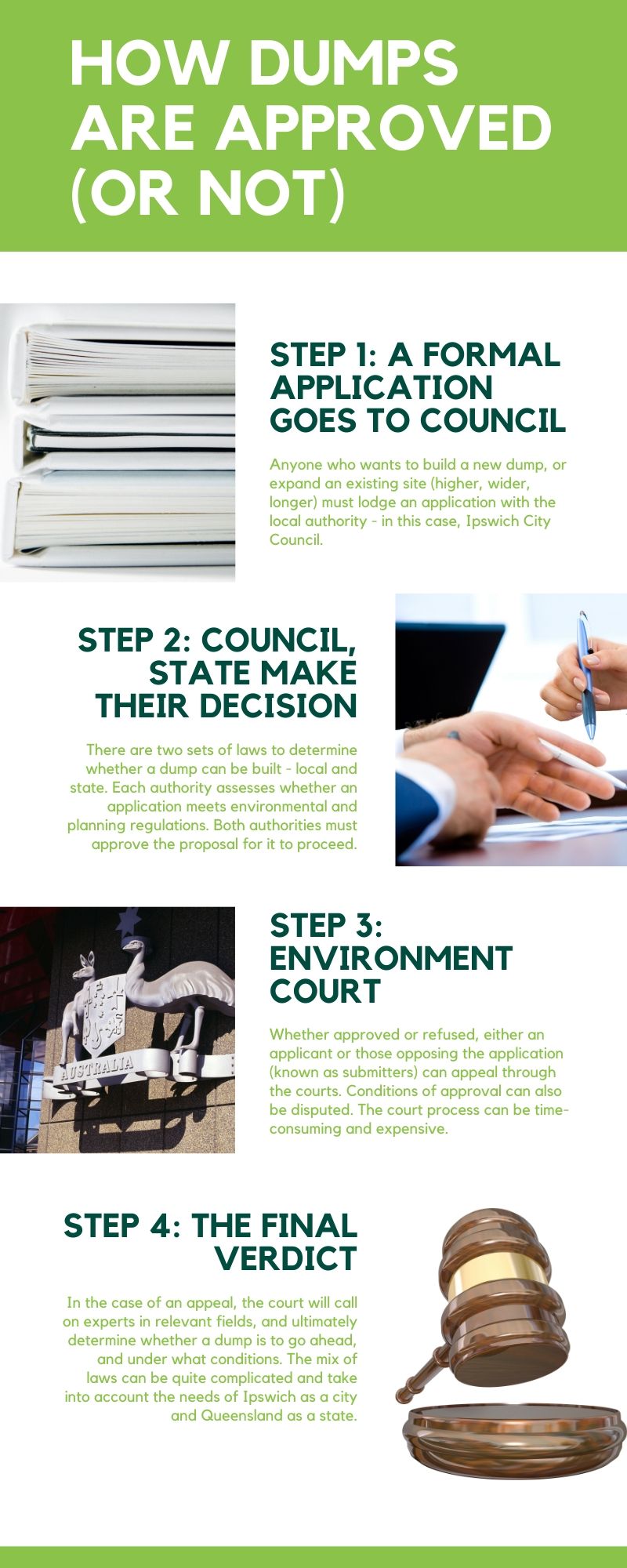
- Can’t council simply refuse to accept and assess new landfill development applications?
Council is required by legislation to accept and assess development proposals pursuant to and against relevant assessment benchmarks including planning legislation, the South East Queensland Regional Plan, the Planning Scheme and any Temporary Local Planning Instruments that are in force.
Council’s Planning Scheme includes a range of zones, sub-areas and overlays which provide a framework for the consideration of potential compatible uses. Planning scheme zones do not limit uses to a single option.
For example, council does not designate land specifically for a waste activity use, but an industrial zone could be used for this and a range of other uses. Potential uses may also be impacted by other matters, such as relevant development constraints or individual circumstances applying to a particular site.
In addition, council does not have the ability to prohibit uses or refuse to receive or assess a development application. This means that anyone can lodge an application over land, including if that proposal is not consistent with the council Planning Scheme or if the proposal has not been supported by council officers for technical reasons.
It is common for council officers to meet with consultants and developers prior to an application being lodged, and sometimes prior to land being purchased for a specific purpose. This meeting can help identify key issues or provide advice going forward, including the suitability of a proposal with reference to the range of requirements considered in a development decision. Despite this, a landowner or developer may still choose to lodge a development application despite it being inconsistent with the relevant assessment benchmarks.
A developer or landowner also does not have to undertake pre-lodgement discussions or advise council that an application is likely to be submitted.
It is worth noting that there are a limited range of developments that are prohibited by related state legislation (this does not include a landfill). As noted above, councils do not have the power to prohibit development.
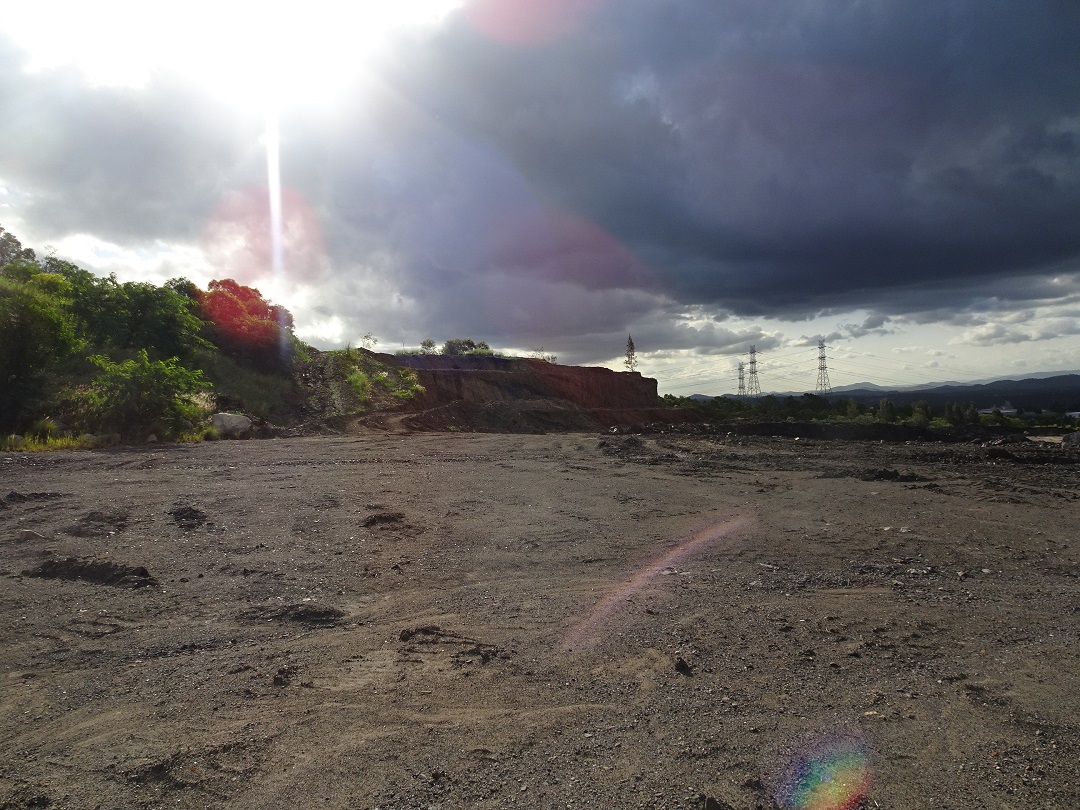
- Why does it take so long to assess a landfill development application?
The approval process for a new landfill is often a complex and lengthy process which involves multiple stakeholders, competing interests and numerous legislative provisions.
In almost all instances a new landfill proposal will be subject to an impact assessable development application process in Ipswich. This means that the application must go through a public consultation stage, thereby allowing members of the public to make a formal submission either objecting or supporting the proposal.
Before it even gets to the public notification stage, council town planning officers will undertake a detailed assessment of the proposal against the relevant assessment benchmarks. An assessment will also be undertaken by numerous technical experts, including council engineers and environmental planners.
In some instances, council officers may also engage the services of an external expert to assist. Upon completing this assessment, council officers will generally issue an information request outlining all of council’s concerns and issues.
The applicant then has three months to respond to council’s information request, however this timeframe may be extended where the issues are extensive and require the input of multiple technical experts. In some instances council may also be required to issue multiple information requests even after the applicant has responded to council’s initial information request.
While council’s town planning officers are undertaking an assessment to determine the appropriateness of the land use, the State Government will generally also undertake its own assessment of what is known as an Environmentally Relevant Activity (ERA). If the State Government approves the ERA it will then seek to regulate the operation of the landfill under environmental conditions. This is what is known as an Environmental Authority (EA). In most instances, the landfill application will also trigger referral to the government’s State Assessment and Referral Agency (SARA) as a concurrence agency, as well as numerous other advice agencies under the provisions of the Planning Regulation 2017.
When the application is referred to SARA, it must undertake an assessment of the landfill application against the relevant provisions of the State Development Assessment Provisions (SDAP) and where approval is recommended by SARA it will likely issue a referral agency response which is subject to conditions. As is the case with council, SARA also has the opportunity to issue an information request and the applicant has similar timeframes to respond.
It is not until after the applicant has satisfactorily responded to all information requests, they have to publically notify the application for a minimum period of 15 business days, and all referral agency responses have been received that the application will then enter the decision stage.
Council town planning officers will then pull together all supporting information and make a recommendation as to whether the proposal should be approved or refused. The decision process for all development applications must then be carried out in accordance with council’s ‘Framework for Development Applications and Related Activities’ policy as well as all related procedures.
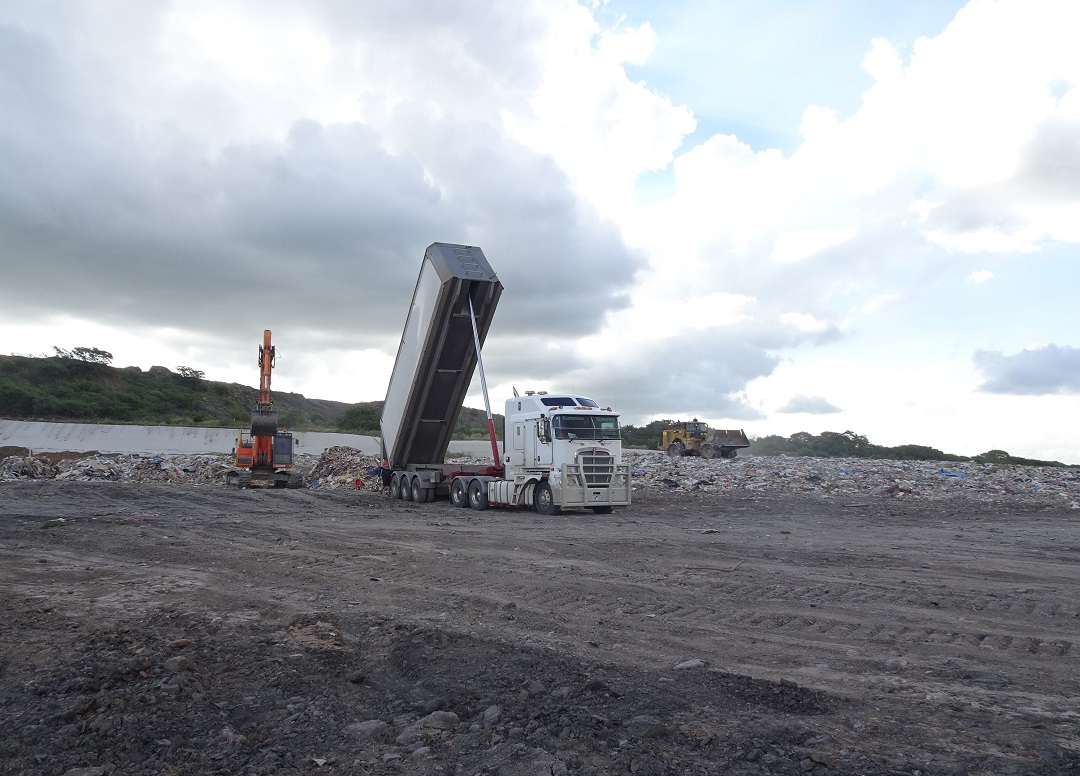
- The community doesn’t want any more landfills in Ipswich so why doesn’t council simply refuse all landfill proposals?
The outcome of landfill development proposals is of interest to a wide range of people and groups, including residents, investors, developers, business owners, government departments, and community groups. With so many competing priorities and interests in landfills and such a rigorous legislative framework, it is important to ensure meaningful consultation is undertaken with relevant entities on the right matters, and views are appropriately defined, reviewed and balanced by council decision makers.
Council is required by legislation to accept and assess development proposals pursuant to and against relevant assessment benchmarks and all applicants must be afforded the right to a fair and reasonable assessment having regard to these assessment benchmarks and also council policies and procedures that are in place.
In deciding a landfill development application, it is imperative that council town planning officers have regard to all relevant facts including the prospects of being able to defend their decision in the Planning and Environment Court. Once a decision is made, both the applicant and those who have made a properly made submission have the right to appeal the decision.
This generally results in a very lengthy and costly court battle, which has the potential to place a significant financial burden on council. Depending upon the outcome, in some instances the appellant can also seek to be awarded costs meaning that if council was to lose an appeal and the court considers the proceeding to have been frivolous or vexatious, the court may then order council to pay not only the legal costs but also the costs of the appellant.
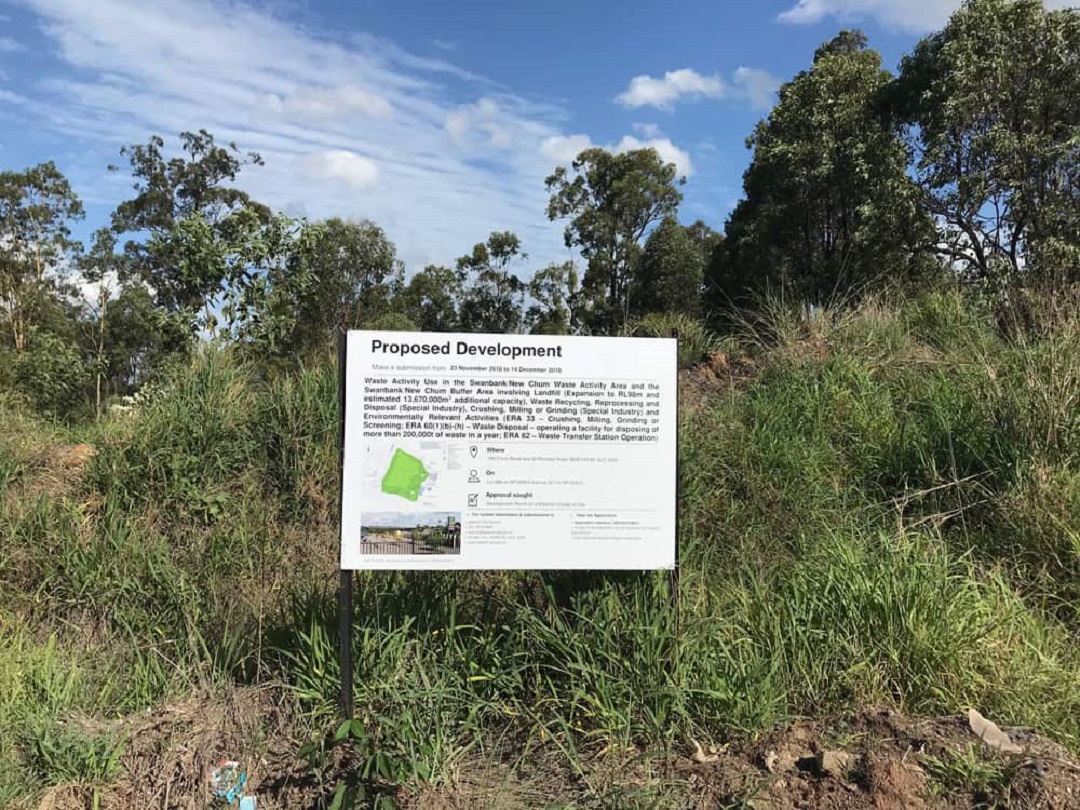
- If there are enough submissions against a new landfill, does that mean council will automatically refuse the development application?
The presence of a large volume of submissions does not always mean that a development application will be refused. Developments that require formal public notification are not always inconsistent with the planning scheme. In addition, the Planning Act 2016 permits the making of a submission, but in order for the submission to be effective, it needs to address relevant technical issues (including planning, engineering, traffic).
Simply objecting to a proposal without sufficient grounds is not an effective way of opposing a development. As a result, in the event that a development is compliant with the relevant assessment benchmarks or conditions can be attached to the decision in order to make it compliant, it may still be approved despite receiving submissions objecting to the proposal – even if there are large volumes of objections.
In addition, submissions can also be made in support of developments and these can also be considered in the assessment process.
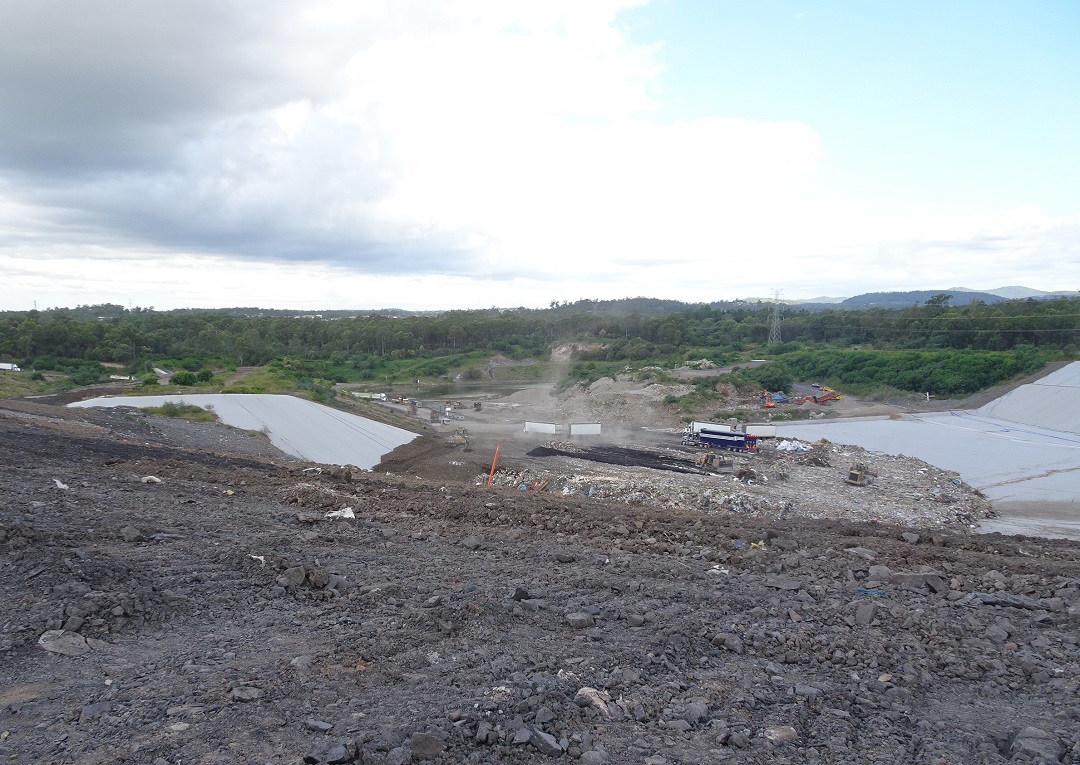
- Who within council decides if a new landfill should be approved or refused?
The decision process for all development applications must be carried out in accordance with council’s decision-making policy titled ‘Framework for Development Applications and Related Activities’ as well as all related procedures.
Development applications and requests that generally comply with the planning scheme and relevant legislative framework are assessed and determined under delegation by council’s senior town planning officers.
Development applications must be reviewed by committee and then decided by full council in the following circumstances:
- If the development application or request requires public notification and more than 20 properly made submissions are received objecting to the proposed development.
- If the Chief Executive Officer determines that the scale, scope, nature and sensitivity of the application or request warrants a council decision, such as a variation request;
- If an application or request is considered by the Chief Executive Officer to involve a matter of Strategic Public Interest or a Strategic Policy Issue, including as a result of a request from the mayor or a councillor to consider a matter to be of Strategic Public Interest or involve a Strategic Policy Issue.
- If a development application has been made by council or a commercial entity of council, and does not relate to the provision of standard local government infrastructure and facilities such as parks (including canteens, storage sheds, lighting and other similar facilities within parks), roads, libraries, community centres or meeting rooms, art and cultural facilities (including public art), emergency services facilities, utilities or the like.
- If the application or request involves a Sensitive Development Matter (a development application or request which is particularly contentious, controversial, or involves a significant departure from the planning scheme, as determined by the General Manager-Planning and Regulatory Services and Chief Executive Officer).
In all circumstances, a recommended decision will be provided in a committee report prepared by council’s town planning officers within the Planning and Regulatory Services Department (with consultation undertaken with officers in other departments as necessary in formulating the recommendation).
Upon reviewing and discussing the town planning officer’s recommendation, councillors will vote on whether or not they support the officer’s recommendation. This voting process will be undertaken in accordance with council’s new Meeting Procedures Policy where a majority vote will ultimately decide the outcome of the development application.
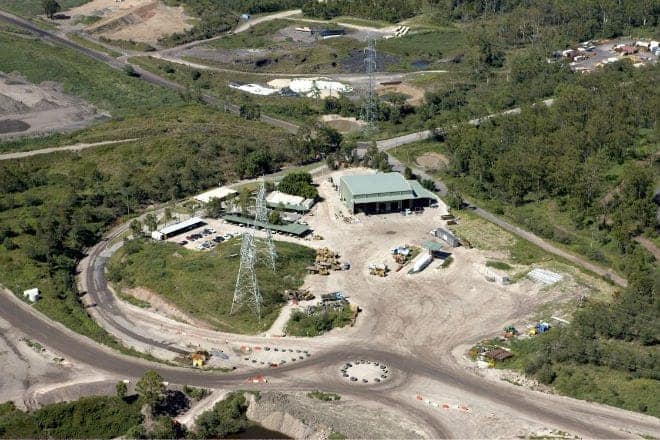

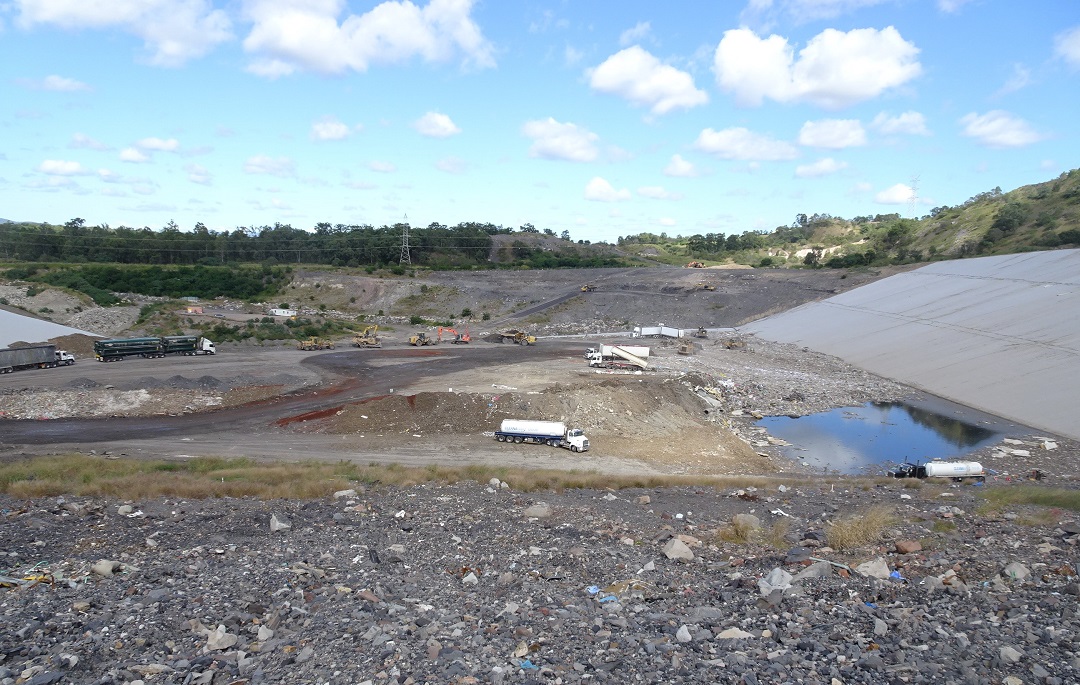

The council is still corrupt.. NO DUMP